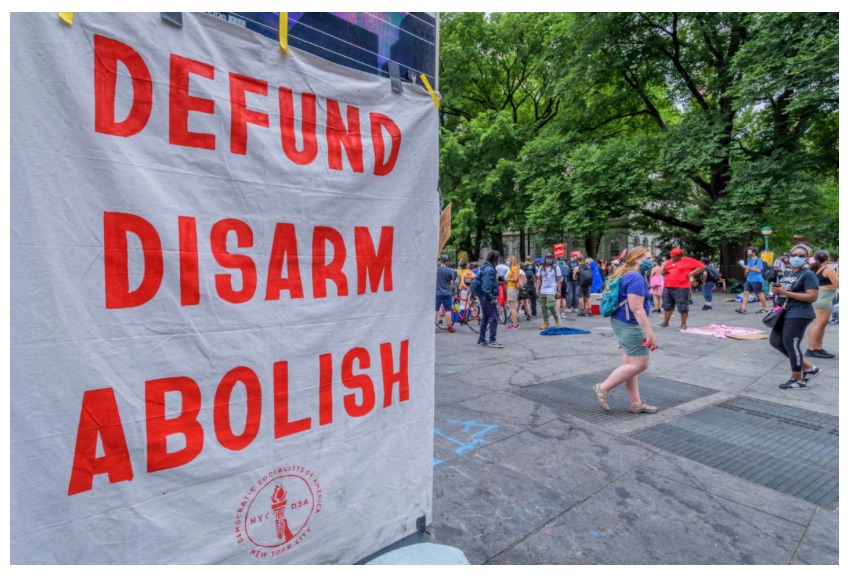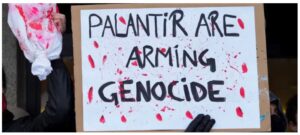Something has come unstuck. The common sense about policing has abruptly changed.
This shift was a long time coming: Prison abolitionists — a movement of scholars and activists, notably spearheaded by Black women such as Angela Davis and Ruth Wilson Gilmore — have spent decades organizing toward a goal of abolishing the prison system. The Black Lives Matter movement and a new generation of Black-led organizing have kindled a new moment in which a world without police feels truly possible.
After decades of expanding police power — bolstered by a hegemonic “law and order” discourse and a bipartisan “tough on crime” agenda — something snapped when Minneapolis police were filmed callously suffocating George Floyd, an unarmed Black man. Suddenly once-staunch defenders of the police — even their own unions — are calling for reform, and moderates advocate defunding specific programs or entire departments. The police have come to be seen as a threat to public safety rather than its instrument, and the ideological framing of “Black criminality” has given way, at least for the moment, to that of institutional racism. More than two-thirds of Americans (69 percent) believe that Floyd’s death is “a sign of broader problems in [the] treatment of black Americans by police,” and 81 percent believe “police in America need to continue making changes to treat blacks equally to whites.” As recently as 2014, it was a minority (43 percent) who saw similar incidents as “a sign of broader problems.”
As cities burned and crowds fought with cops, surveys showed that three-quarters of Americans (78 percent) saw the anger driving the uprisings as at least partially justified, and a majority (54 percent) felt similarly about the protesters’ militant tactics, including the burning of Minneapolis’s Third Precinct station house. Twice as many people — including a majority of whites — report being concerned about police violence as express concern over protester violence. A large majority (74 percent) express support for the protests (47 percent “strongly support” them).
Riots get results. The cops who killed George Floyd are being prosecuted; many departments are banning chokeholds; and police chiefs, district attorneys and other law enforcement leaders have resigned, one after another, across the country. Police budgets are being slashed, with the funds reallocated to social spending — reversing the trajectory of the last half-century. The Minneapolis City Council voted to disband its police force altogether and try something else instead.
Some of the concessions responded to long-standing complaints, and others represent changes that no one had even demanded: Lego is de-emphasizing police-themed toys. Babynames.com featured a stark black banner on its front page listing dozens of victims of racist violence, beginning with Emmett Till, and reminding us that, “Each one of these names was somebody’s baby.” The long-running television program “Cops” was abruptly cancelled. Corporations started pouring money into civil rights organizations, and celebrities publicly challenged each other to bail out arrested protesters.
*
Twenty years ago, I began work on a history of policing in the United States, which appeared in 2004 under the title Our Enemies in Blue. (It is now in its third edition.) The main argument of the book is that the core function of the police is not to fight crime, to protect life and property, or even to enforce the law, but instead to preserve existing social inequalities, especially those based on race and class. In making that case, I looked at the origins and development of the institution, the centrality of violence in police work, and the persistent bias in the law and its enforcement. I also forwarded a number of contentious (and at the time, almost heretical) claims: that modern policing originated not in the New England town watch, but in the Southern slave patrols — militia groups responsible for enforcing pass laws and preventing uprisings; that cops are not workers and police unions are not labor unions; that community policing is not a program for progress but a counterinsurgency strategy; and that the institution of policing must be abolished rather than reformed. At the time, none of those were accepted positions, even among many strident critics of the police. They remain today minority views, but it has become a substantial minority. These points have entered the mainstream discourse: Historians increasingly acknowledge the significance of slave patrols. Unions are calling into question the legitimacy of police unions, and even breaking ties with them. The military literature has become increasingly explicit in comparing community policing with counterinsurgency. And even mainstream politicians find themselves debating the question, not merely of reforming the police department, but of defunding or disbanding it.
Meanwhile, the agenda of activists has quickly expanded beyond policing: Around the world, crowds pulled down statues of Confederate generals and slave owners. Popular Mechanics ran articles offering practical advice on avoiding police surveillance at protests, and a how-to guide to pulling down racist statues. NASCAR barred displays of the Confederate battle flag, and Mississippi decided to remove the Stars and Bars from its state flag. A street adjacent to the White House has been renamed “Black Lives Matter Plaza.” Employers adopted Juneteenth as a paid holiday. And Johnson and Johnson announced a new line of darker Band-Aids.
Many of these gestures are purely symbolic. But while some changes may not do much, that is not to say that symbolic gestures are meaningless: the symbolism itself demonstrates something of the emerging consensus.
In addition to being a pivotal moment for organizers, this shift in public consciousness would seem to recommend an expanded agenda for researchers. Most crucially, we should find ways to put our work in the service of social movements, always remembering that it is the movement, and not the scholarship, that propels change.
We should, of course, continue to document the prevalence of police violence, analyze its causes and evaluate proposed reforms. But in the present crisis, provisional answers are already available and widely circulating. What is more urgently needed is further work documenting and evaluating alternatives to policing, identifying best practices and organizational features that correlate with good outcomes.
Furthermore, we must work to situate abolition as part of a revolutionary program, to make clear the limits of defunding (or even disbanding) the police, and to make the argument that abolition cannot end with policing, but must extend to the entire criminal legal apparatus — the machinery of prosecutions and punishment, even probation and “community-based” corrections. We must not be afraid to embrace the radicalism of such proposals. Just as we highlight the structural role the police play in economic exploitation and racial oppression, we must articulate the importance of abolition in the broader revolutionary project of overthrowing white supremacy and capitalism.
[Editor’s note: When Joe Biden is doing so well (according to MSM polls), why are left-wing web sites like Truthout, Common Dreams, and Reader Supported News begging for donations? Could it be that treason and subversion don’t generate a lot of financial support? that the polls are wrong? that abolishing the police is not a popular cause? It does make you wonder.]




Minneapolis was not enough.
Seattle was not enough.
Portland was not enough.
NYC was not enough.
Chicago was not enough.
Now they want the White House. And it’s OK to advertise on Twitter.
Does anyone actually think this will happen.
Does it get any more bizarre?
https://www.zerohedge.com/political/whitehousesiege-group-plans-lay-siege-occupy-white-house-next-month
Men and women degrading themselves. Have they no pride, self respect or sense of right or wrong?
Will this stain on the American flag and the American psyche ever be removed? I doubt it. Minneapolis, Seattle, Portland, NYC and now Chicago. Mr. Trump…come out of hiding and bring this treason to an end.
This is disgusting, unacceptable and an attempt to overthrow a society.
It cannot continue.
https://153news.net/watch_video.php?v=6AHA5AY11ANM
https://153news.net/watch_video.php?v=637D6798RWR5
https://153news.net/watch_video.php?v=D6OX1YKW64GO
Again, California shows it’s true colors…this is so blatant, it’s hard to comprehend…
https://www.zerohedge.com/political/california-will-soon-be-paying-1250-people-who-test-positive-coronavirus
Go back to sleep, America…all is fine…not a thing to be concerned with….just keep buying, buying buying……after all, what do you think those stimulus checks were for….WE will take care of you!
We own you! But we still love you…just keep buying!!
https://153news.net/watch_video.php?v=NMDKM9315A67
In Mexico where I live, both gringos and Mexicans wear masks. Most Mexicans realize it is a scam and simply endure the mask in order to continue in government regulated business. I know this because I talk to taxi drivers. However, on those rare occasions when I speak to gringos and mention the Covid scam, blank looks appear on their faces. They are clueless! One gringo from Chicago told me today that Korea might be a good place to take up residence (he was thinking of moving) because the government there is ultra strict on mask compliance.
Trump depends on Jewish money. This is the problem.
https://www.politico.com/news/2020/08/08/trump-antagonizes-sheldon-adelson-phone-call-392688
Who’s the chukker writing this article? It sounds like something that would get an A in a college sociology class. Another out of touch and/ race profiteering Negro (or maybe she’s white, no difference) contributing zero to solving real problems of police misconduct. A recent Gallup poll found most blacks do NOT want fewer police. Go to YouTube and type in Anthony Brian Logan and then scroll down to his video “81% of Black Americans Don’t Want Less Police.” If you don’t find the video, type in its title in the search box. Logan knows of what he speaks as he grew up in “bad neighborhoods” and gives viewers the real dang deal on who, what, why about these areas. And this poll didn’t just call blacks in crime-ridden areas. The majority of blacks in any socio-economic group support police and oppose defunding them. Yes, we acknowledge there are problems with police but even the most brain-addled-by-CNN-MSNBC black has sense enough to know the police are the defense against the criminals who aim to do you harm.
I stopped reading the article when she wrote the police suffocated George Floyd. Maybe we should defend journalists.
Of course. I published it for insights into the demented thoughts of the left-wing of the Democrat Party, which is doing massive harm to the people of the United States and deserve never winning another election in the future history of this nation.
Social Distancing dehumanizes people which is exactly what Marxists want. Humans are social beings who require contact with their fellow beings. Take away human one on one contact and you create nothing but wild animals.
Concerning Polls taken in black neighborhoods, the vast majority support police and many call for more police.
You are correct!
From one extreme to the other. From what was becoming a military style police presence to none. In a logical common sense society, does that type of extreme change make any sense at all……OTHER than appealing to the extremists who are trying to bring down America.
Where did the middle ground go?
My opinion is it left with the ability to converse, debate and meet on common ground face to face, not on devices that remove the NUANCES of human interaction.
Isn’t this the way AI would settle problems….human-less and heartless?
Is this why so many are being made to wear masks to disguise their humanity….to take the heart out of decisions?
The George Floyd incident was not another cop run wild event. It was a false flag designed as an insurance policy by the Dems. Their CONrona PLANdemic was not tanking Trump’s poll numbers sufficiently so when all else fails, bring out the never-fail race card. In addition, this false flag helped the fascist agenda: Fewer police mean Mad Max apocalypse cities and towns that get so bad the UN police force steps in to control the public. This control includes surveillance and contact tracing to insure your thoughts and actions are in line with the official narrative and punishment, getting regular vaccines, and maintaining the AI chips in your head. Those not in compliance will be rounded up and either sent to re-education camps and/or injected with vaccines and AI chips that bring them “into compliance.” The cancel culture b.s. with removing statues, Aunt Jemima from the pancake box, and Redskins as team nickname, etc are tactics to distract the public as the powers that be implement their Orwellian agenda.
Was this in reply to my comment?